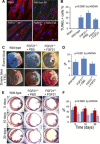Fibroblast growth factors in cardiovascular disease: The emerging role of FGF21
- PMID: 26232236
- PMCID: PMC4747916
- DOI: 10.1152/ajpheart.00527.2015
Fibroblast growth factors in cardiovascular disease: The emerging role of FGF21
Abstract
Early detection of risk factors for enhanced primary prevention and novel therapies for treating the chronic consequences of cardiovascular disease are of the utmost importance for reducing morbidity. Recently, fibroblast growth factors (FGFs) have been intensively studied as potential new molecules in the prevention and treatment of cardiovascular disease mainly attributable to metabolic effects and angiogenic actions. Members of the endocrine FGF family have been shown to increase metabolic rate, decrease adiposity, and restore glucose homeostasis, suggesting a multiple metabolic role. Serum levels of FGFs have been associated with established cardiovascular risk factors as well as with the severity and extent of coronary artery disease and could be useful for prediction of cardiovascular death. Furthermore, preclinical investigations and clinical trials have tested FGF administration for therapeutic angiogenesis in ischemic vascular disease, demonstrating a potential role in improving angina and limb function. FGF21 has lately emerged as a potent metabolic regulator with multiple effects that ultimately improve the lipoprotein profile. Early studies show that FGF21 is associated with the presence of atherosclerosis and may play a protective role against plaque formation by improving endothelial function. The present review highlights recent investigations suggesting that FGFs, in particular FGF21, may be useful as markers of cardiovascular risk and may also serve as protective/therapeutic agents in cardiovascular disease.
Keywords: angiogenesis; atherosclerosis; biomarker; coronary artery disease; fibroblast growth factor.
Copyright © 2015 the American Physiological Society.
Figures




References
-
- An SY, Lee MS, Yi SA, Ha ES, Han SJ, Kim HJ, Kim DJ, Lee KW. Serum fibroblast growth factor 21 was elevated in subjects with type 2 diabetes mellitus and was associated with the presence of carotid artery plaques. Diabetes Res Clin Pract 96: 196–203, 2012. - PubMed
-
- Badman MK, Pissios P, Kennedy AR, Koukos G, Flier JS, Maratos-Flier E. Hepatic fibroblast growth factor 21 is regulated by PPARalpha and is a key mediator of hepatic lipid metabolism in ketotic states. Cell Metab 5: 426–437, 2007. - PubMed
-
- Barutcuoglu B, Basol G, Cakir Y, Cetinkalp S, Parildar Z, Kabaroglu C, Ozmen D, Mutaf I, Bayindir O. Fibroblast growth factor-19 levels in type 2 diabetic patients with metabolic syndrome. Ann Clin Lab Sci 41: 390–396, 2011. - PubMed
-
- Battler A, Scheinowitz M, Bor A, Hasdai D, Vered Z, Di Segni E, Varda-Bloom N, Nass D, Engelberg S, Eldar M, Belkin M, Savion N. Intracoronary injection of basic fibroblast growth factor enhances angiogenesis in infarcted swine myocardium. J Am Coll Cardiol 22: 2001–2006, 1993. - PubMed
Publication types
MeSH terms
Substances
Grants and funding
LinkOut - more resources
Full Text Sources
Other Literature Sources
Medical

